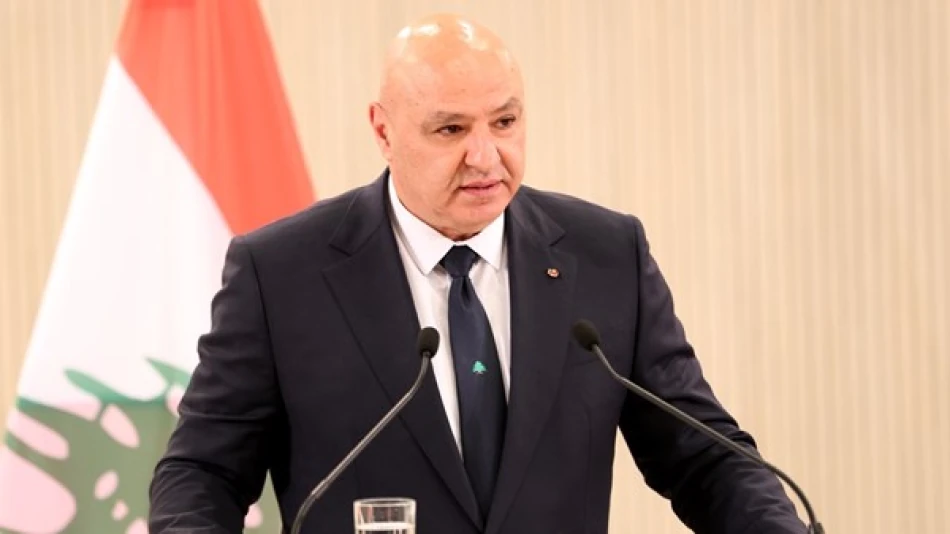
Lebanon’s President Draws Red Line on Hezbollah as He Seeks Global Reset
Lebanon's New President Draws Hard Line on Sovereignty as He Seeks International Reset
Lebanese President Joseph Aoun delivered his strongest statement yet on national unity and state authority, declaring that Lebanon's territorial integrity is non-negotiable while signaling a diplomatic push to rebuild the country's international standing. Speaking to tourism and banking officials, Aoun emphasized that only the state should control weapons and military decisions—a direct challenge to Hezbollah's armed presence that has long complicated Lebanon's sovereignty.
Constitutional Oath Becomes Political Weapon
Aoun invoked his presidential oath twice during the meeting, stating he had sworn to "preserve the independence of the homeland and the safety of its territories." The president made clear that anyone expecting him to break this oath or accept proposals that compromise Lebanese unity would be mistaken. This language represents a notable hardening of tone from Lebanon's presidency, traditionally a more ceremonial role that avoids direct confrontation with armed groups.
The reference to swearing the oath "twice" likely alludes to both his recent presidential inauguration and his earlier military service, where he previously took oaths to defend Lebanon. This personal framing suggests Aoun is positioning himself as a continuity candidate for Lebanese sovereignty rather than a compromise figure.
The Taif Gambit: Reasserting State Monopoly on Force
Aoun's invocation of the Taif Agreement—the 1989 accord that ended Lebanon's civil war—carries particular weight in Lebanese politics. By citing Taif's provisions that the state should have exclusive control over weapons and decisions of war and peace, Aoun is essentially arguing that Hezbollah's armed wing violates Lebanon's foundational post-war settlement.
This represents a significant shift from previous Lebanese administrations that often avoided direct confrontation with Hezbollah over the weapons issue. The timing is crucial: Hezbollah has been significantly weakened by its recent conflict with Israel, potentially creating political space for such assertions that would have been unthinkable during the group's peak influence.
International Rehabilitation Strategy
Aoun revealed that his planned visits to multiple countries aim to "rebuild bridges between Lebanon and the world." This diplomatic offensive comes as Lebanon faces severe economic crisis, with its currency having lost over 90% of its value since 2019 and much of its population living in poverty.
The international community has long demanded that Lebanon implement meaningful reforms and address Hezbollah's role before providing substantial aid. Aoun's rhetoric on state authority over weapons could be positioning Lebanon for renewed international engagement, particularly with Gulf states that have distanced themselves due to Hezbollah's influence.
Market and Regional Implications
For investors and regional partners, Aoun's statements signal potential policy shifts that could affect Lebanon's economic recovery prospects. The country's bonds and banking sector have suffered from international isolation, with many global institutions avoiding Lebanese exposure due to sanctions risks and governance concerns.
However, any confrontation with Hezbollah over weapons could also trigger domestic instability, creating a delicate balance between satisfying international demands and maintaining internal peace. The president's emphasis on Lebanese "creativity" and "strong will" in exploiting opportunities suggests awareness that economic recovery requires both domestic unity and international support.
Testing Political Reality
While Aoun's rhetoric marks a clear departure from his predecessors' more accommodating approach to Hezbollah, the real test will be implementation. Previous Lebanese governments have made similar declarations about state authority without meaningful follow-through, often due to Hezbollah's political and military leverage.
The current regional context—with Hezbollah weakened, Iran distracted by multiple conflicts, and international pressure mounting—may provide Aoun with more maneuvering room than his predecessors enjoyed. Success in reasserting state authority could unlock international aid and investment, while failure could deepen Lebanon's isolation and economic crisis.
Most Viewed News

 Layla Al Mansoori
Layla Al Mansoori






